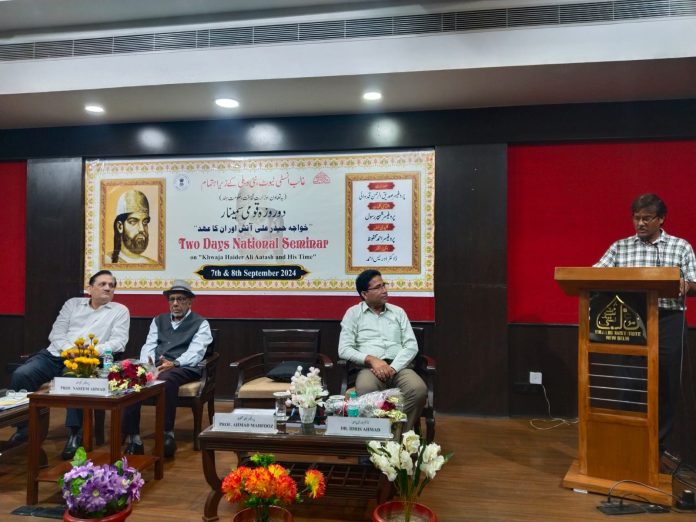New Delhi, Sep 7: The two-day national seminar titled ‘Khwaja Haider Ali Atish and His Era,’ organized by the Ghalib Institute, opened with a keynote address by Professor Ahmad Mahfooz. The seminar delved into the classical contributions of Khwaja Haider Ali Atish, a distinguished poet known for his profound impact on Urdu ghazal.
Professor Mahfooz highlighted that Atish remains a towering figure in Urdu literature, emphasizing his unique identity in the realm of classical poetry. He noted that while Atish’s poetry is often praised for its natural elements and linguistic elegance, his role as a poet of profound thought is less frequently acknowledged. Mahfooz encouraged contemporary poets to draw inspiration from Atish’s mastery and skillful expression.
The seminar was inaugurated by Professor Shehpar Rasool, Vice Chairman of the Delhi Urdu Academy, who stressed the need to revisit the technical aspects of Atish’s poetry. He remarked on how shifting critical priorities can overshadow valuable literary contributions if not periodically re-evaluated.
Professor Naseem Ahmad, former Head of the Urdu Department at Banaras Hindu University, chaired the inaugural session. In his presidential speech, he expressed his deep appreciation for classical poetry, mentioning his work on the Deewan of Mushafi, Atish’s mentor. Ahmad commended the Ghalib Institute for initiating discussions on Atish, hoping it will renew interest in his poetry.
Dr. Idris Ahmad, Director of the Ghalib Institute, underscored the significance of the seminar, describing it as both a topic of study and a duty. He highlighted the rich tradition of Urdu poetry associated with Atish and his school, which gifted the literary world with timeless works like ‘Sahr al-Bayan’ and ‘Zahr-e-Ishq.’ He also announced that the seminar papers will be published in book form to extend their reach and utility.
The opening session was attended by prominent figures, students, and researchers. The remaining sessions of the seminar will continue on September 8, 2024, from 10 a.m. to 5 p.m.




